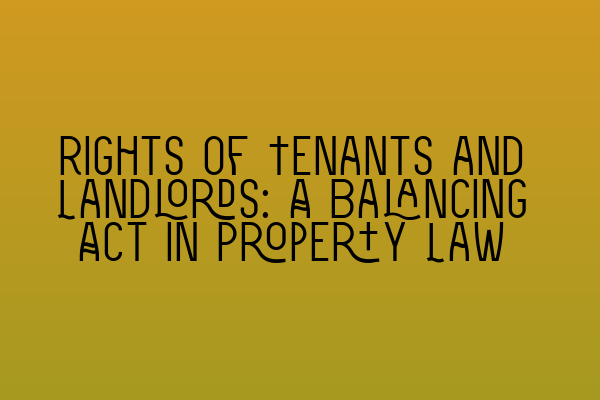Rights of Tenants and Landlords: A Balancing Act in Property Law
In the realm of property law, one of the key relationships that requires careful consideration is that between tenants and landlords. Both parties have rights and obligations that must be upheld to ensure a fair and harmonious living arrangement. This delicate balancing act is essential to maintaining a healthy rental market and protecting the interests of all involved.
As a solicitor specializing in property law at SQE Property Law & Land Law, I have witnessed firsthand the complexities and challenges that arise in this tenant-landlord dynamic. In this blog post, we will explore the rights of tenants and landlords, shedding light on their respective obligations and how they can best navigate the intricacies of property law.
1. The Rights of Tenants
Tenants enjoy a range of rights that afford them security and protection within the premises they rent. These rights include:
a. Right to Quiet Enjoyment: Tenants have the right to peacefully and undisturbedly enjoy their rented property. Landlords must provide a habitable and safe living environment, free from interference, harassment, or unreasonable disturbances.
b. Right to Safety and Habitability: Landlords are responsible for ensuring that the rental property meets certain health and safety standards. This includes providing essential services such as water, heating, and electricity, as well as maintaining the structural integrity of the property.
c. Right to Privacy: Tenants have the right to privacy within their rented premises. Landlords must respect their privacy and seek their consent before entering the property, except in cases of emergency or as otherwise agreed upon in the tenancy agreement.
d. Right to Repairs: If the rental property requires repairs that affect its habitability, tenants have the right to request that the landlord address these issues promptly. Landlords are obliged to maintain the property in a reasonable state of repair and fix any defects that arise during the tenancy.
2. The Rights of Landlords
Landlords, too, possess a set of rights that enable them to effectively manage their property and safeguard their investment. These rights include:
a. Right to Receive Rent: Landlords have the right to receive rent from their tenants in accordance with the terms of the tenancy agreement. This includes the timely payment of rent and adherence to any other financial obligations outlined in the agreement.
b. Right to Property Access: While tenants have the right to privacy, landlords also have the right to access the property for certain reasons. These may include carrying out necessary repairs, conducting inspections, or in the case of an emergency.
c. Right to Protect the Property: Landlords have the right to take reasonable measures to protect their property from damage or misuse. This may involve setting certain rules and restrictions, such as prohibiting pets or limiting the number of occupants.
d. Right to Enforce Terms of the Tenancy Agreement: Landlords have the right to enforce the terms and conditions outlined in the tenancy agreement. This may include addressing breaches of the agreement or pursuing legal action in the event of non-compliance.
3. Balancing the Scale
While it is important to acknowledge the rights of both tenants and landlords, it is equally vital to find a balance between these rights. Property law aims to strike a fair and equitable solution that protects the interests of both parties. This can be achieved through clear and comprehensive tenancy agreements that outline the responsibilities and expectations of both tenants and landlords.
Additionally, effective communication and cooperation between tenants and landlords can help prevent conflicts and ensure a positive rental experience for all involved. Regular property inspections, open lines of communication, and prompt resolution of any issues that arise can go a long way in fostering a harmonious tenant-landlord relationship.
In conclusion, the rights of tenants and landlords form a delicate balancing act in property law. By understanding these rights and working together, tenants and landlords can navigate the intricacies of property law, fostering a mutually beneficial living arrangement. Should conflicts arise, seeking legal advice from a qualified solicitor specializing in property law is advisable to ensure a fair and just resolution.
If you are interested in further expanding your knowledge of property law and preparing for the SQE exams, we recommend browsing the following related articles:
– SQE 1 Practice Exam Questions
– SQE 1 Practice Mocks FLK1 FLK2
– SQE 2 Preparation Courses
– SQE 1 Preparation Courses
– SRA SQE Exam Dates
At SQE Property Law & Land Law, we are dedicated to providing comprehensive legal services and support to our clients. Whether you are a tenant or a landlord, our team of experienced solicitors is here to assist you in navigating the complexities of property law and ensuring your rights are protected.
